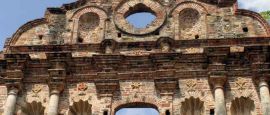Spread out along a wide bay, Panama City is a curiously appealing blend of colonial Spain and cosmopolitan modernity, well worth a couple of days’ exploration. The historic old town is a UNESCO World Heritage Site, its narrow cobblestone streets lined with elegantly faded colonial buildings, whereas the new areas of the city are full of gleaming skyscrapers housing multinational corporations.
Panama things to see and do
Tourist offices
Address: Avenida Balboa and Alquilino de la Guardia, BICSA Financial Center, 29th Floor, Panama City, Panama
Tel: +507 526 7000.
www.visitpanama.com
Straddling the border with Costa Rica, the dormant Baru Volcano is a superb setting for a day’s hiking or horseback ride, with the added potential excitement of spotting a quetzal, one of Central America’s most iconic birds. Reaching 3,475m (11,400ft), it is located in beautiful Chiriquí Province, near the popular resort town of Boquete and the mountain resort, Cerro Punta.
A cruise along the Panama Canal is a once-in-a-lifetime experience. You can do a partial trip or go from Colon all the way to Panama City. The scenery en route is beautiful and the mechanics of the canal fascinating. Also recommended is the Panama Canal Museum in the capital’s Casco Viejo, which details the canal’s spectacular engineering and its human and environmental cost.
If you like your jungle experience to come with luxurious trappings, visit the Gamboa Tropical Rainforest Reserve. Less than an hour from Panama City between the Chagres River and the Panama Canal, the reserve is home to a wealth of tropical wildlife, but also has a five-star resort, and tree-top eco-lodge.
Apart from its stunning Caribbean location, the Bocas del Toro archipelago is one of Panama’s top diving and snorkelling locations. You’ll be amazed by the variety of marine life on offer here, but other diving hotspots include the Isla Grande, near Portobelo, where dive centres run excursions to the best reefs, and the San Blás Islands, off the northeast coast.
Take a day trip from Panama City to the island of Barro Colorado in Gatun Lake, a vast manmade stretch of water created during construction of the Panama Canal. The island is a biological reserve and reputed to be one of the world's leading natural tropical laboratories; you can hike around the island in a few hours, spotting wildlife such as monkeys, anteaters and birds.
Capital of the Los Santos province of Panama, Las Tablas plays host to several bustling fiestas throughout the year, including one of the country’s best Carnival celebrations. The Las Tablas Carnival involves two factions, each with a parade and its own festivities, trying to outdo the other. You don’t have to take sides, just join in with both groups.
The sparsely populated wilderness of the Darién Gap is one of Central America’s most inaccessible regions. Nevertheless, you can explore trails in the Darién National Park, which contains sandy beaches, rocky coasts, mangroves, swamps and tropical rainforest. The park is also home to two Choco Indian tribes, as well as one of the world’s greatest concentrations of bird species.
Panama City’s Casco Viejo is its old quarter; highlights are the Plaza de Francia, the Paseo de las Bóvedas, San José Church, with its magnificent golden Baroque altar, and the Santo Domingo Church, next to which is the Museum of Colonial Religious Art. The most impressive building in Panama City, however, is the President's Palace, an opulent 17th-century mansion overlooking the bay.
Embark on a tree canopy adventure in the El Níspero Botanical Gardens, in central Panama’s Anton Valley. Hoick yourself into a harness, climb up to the treetops and then swing from one platform to another like Tarzan on a day-trip. Get up among the birds and enjoy the greenery from their perspective.
Escape the noise and traffic of Panama City and hop on the ferry to the island of Taboga, with its fine beaches and clean sea air. The best way to get there is by local water taxi, known as a panga. A longer trip by launch is necessary to get to the Pearl Islands, which are visited mainly by sea-anglers and whale-watchers.
Take an excursion to the ruins of Panama Viejo, including the square tower of the old cathedral, in the capital’s western suburbs. This is the original Panama City, sacked in 1671 by celebrated Welsh buccaneer Henry Morgan, who helped undermine Spanish control of their colonies. Clamber around the crumbling walls, which also contain a museum and an excellent handicrafts market.
Along with Venado and Rio Mar in the Pacific and Isla Grande, Bluf and Careneros in the Atlantic, Santa Catalina is known as a prime surfer’s spot in Panama. Waves can reach 4.5m (15ft), and you can find good surfing almost all year round. Panama is just beginning to be discovered as a surfer’s paradise, so get down there before the crowds come.
One of Panama’s most popular adventures is to the San Blas Islands, home of the Kuna, considered the most autonomous indigenous people of Latin America. The inhabitants live a traditional agriculture and fishing-based life, supported by tourism. The colourfully dressed women produce equally vivid mola embroideries for sale to visitors. You can stay here in rustic lodges, snorkel off the beach, and tour the local villages.
Visit this western coastal province to see some of the country’s most spectacular scenery, with volcanic highlands, waterfalls, and rivers, as well as banana and coffee plantations. Chiriquí is also host to Las Balserias, a Ngöbé-Bugle Indian celebration featuring a contest in which the young men toss balsa logs at one another; those who emerge unscathed may choose their partners.
Do you have any Feedback about this page?
© 2026 Columbus Travel Media Ltd. All rights reserved. No part of this site may be reproduced without our written permission, click here for information on Columbus Content Solutions.








 You know where
You know where